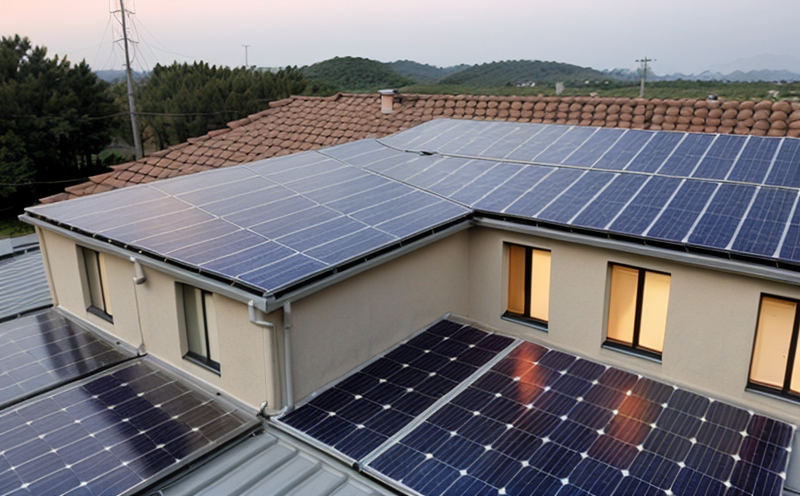Assessing Solar Panel Efficiency in Low-Light Conditions
Assessing Solar Panel Efficiency in Low-Light Conditions A Crucial Service for Businesses
As the world shifts towards renewable energy sources, solar panels have become an essential component of many businesses sustainability strategies. However, one of the most significant challenges facing solar panel manufacturers and installers is assessing the efficiency of their products under low-light conditions. This is where Eurolabs laboratory service, Assessing Solar Panel Efficiency in Low-Light Conditions, comes into play.
What is Assessing Solar Panel Efficiency in Low-Light Conditions?
Assessing Solar Panel Efficiency in Low-Light Conditions involves testing solar panels to determine their performance and efficiency under various low-light conditions. This includes measuring the voltage and current output of the panels at different light intensities, as well as evaluating their power conversion efficiency (PCE). The test results provide valuable insights into how the solar panels will perform in real-world conditions, helping businesses make informed decisions about their investment.
The Importance of Assessing Solar Panel Efficiency in Low-Light Conditions
Businesses that invest in solar panels want to ensure they get a good return on their investment. However, most solar panels are designed for optimal performance under ideal lighting conditions (i.e., direct sunlight). The problem is that many real-world applications involve partial shading or low-light conditions, which can significantly impact the efficiency of the panels.
Assessing Solar Panel Efficiency in Low-Light Conditions helps businesses address this issue by providing a clear understanding of their solar panels performance under various conditions. This information enables them to
Make informed decisions about panel selection By evaluating the performance of different solar panel models, businesses can choose the ones that best suit their specific needs.
Optimize installation and layout Knowing how panels perform in low-light conditions helps installers optimize the layout and orientation of the solar array for maximum energy production.
Ensure compliance with industry standards Many industries, such as building construction and electrical engineering, require compliance with specific standards and regulations. Assessing Solar Panel Efficiency in Low-Light Conditions ensures that businesses meet these requirements.
The Advantages of Using Eurolabs Laboratory Service
Eurolabs laboratory service offers numerous benefits to solar panel manufacturers, installers, and end-users. Some of the key advantages include
Accurate and reliable test results Our state-of-the-art laboratory equipment and experienced technicians ensure that test results are accurate and reliable.
Comprehensive testing capabilities We offer a range of tests to evaluate solar panel performance in low-light conditions, including
Voltage and current output measurements
Power conversion efficiency (PCE) evaluation
Temperature and spectral response analysis
Shading and partial shading tests
Expert analysis and interpretation Our team of experts will analyze the test results and provide a detailed report, highlighting areas for improvement and recommendations for optimization.
Fast turnaround times We understand that businesses need fast and reliable test results to meet project deadlines. Our laboratory service ensures quick turnaround times without compromising on quality.
Benefits of Using Eurolabs Laboratory Service
Here are some key benefits of using Eurolabs laboratory service
Improved accuracy and reliability Our laboratory equipment and techniques ensure accurate and reliable test results.
Increased efficiency and productivity By understanding how solar panels perform in low-light conditions, businesses can optimize their installation and layout for maximum energy production.
Compliance with industry standards Our tests meet or exceed industry standards, ensuring that businesses comply with regulations and requirements.
Cost savings Identifying areas for improvement early on saves businesses money by reducing the need for costly rework or replacement of panels.
Enhanced customer satisfaction By providing accurate and reliable test results, Eurolab helps businesses build trust with their customers and improve overall satisfaction.
QA Section
Here are some frequently asked questions about Assessing Solar Panel Efficiency in Low-Light Conditions
Q What types of solar panels can be tested?
A Our laboratory service is suitable for a wide range of solar panel models, including crystalline silicon (c-Si), thin-film, and bifacial panels.
Q How long does the testing process take?
A The testing time varies depending on the type of test and the complexity of the analysis. However, our laboratory service ensures quick turnaround times without compromising on quality.
Q What kind of data is provided in the test report?
A Our test reports provide detailed information about the solar panels performance under low-light conditions, including voltage and current output measurements, PCE evaluation, temperature and spectral response analysis, and shading tests.
Q Can Eurolabs laboratory service meet industry standards and regulations?
A Yes, our laboratory service meets or exceeds industry standards, ensuring that businesses comply with regulations and requirements.
Conclusion
Assessing Solar Panel Efficiency in Low-Light Conditions is a crucial service for businesses investing in solar panels. By evaluating the performance of their products under various low-light conditions, businesses can make informed decisions about panel selection, optimize installation and layout, and ensure compliance with industry standards. Eurolabs laboratory service offers numerous benefits, including accurate and reliable test results, comprehensive testing capabilities, expert analysis and interpretation, and fast turnaround times.
Dont let your business suffer from inefficient solar panels in low-light conditions. Contact us today to learn more about our Assessing Solar Panel Efficiency in Low-Light Conditions laboratory service.




